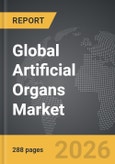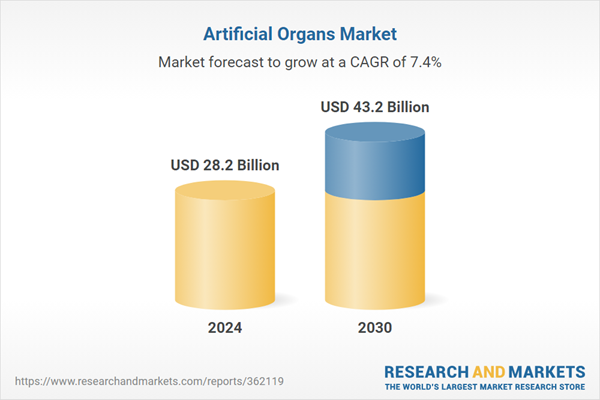Global Artificial Organs Market - Key Trends and Drivers Summarized
The Bionic Man: Still a Figment of Our Imagination, but We Are Getting There Slowly and Decisively
Imagine a world where the bionic man walks among us, not just in the flickering frames of a sci-fi film but as a part of our everyday reality. With each beat of his engineered heart and each breath drawn by synthetic lungs, this marvel of modern science mirrors the intricate symphony of human biology. Artificial organs, once mere sketches on research lab whiteboards, now pulse with life within him. His veins course with lab-crafted blood, his eyes see with the clarity only high-definition cameras can provide, and his touch is gentle with fingers engineered to mimic the softness of human skin. While the true incarnation of the bionic man remains nestled in the realm of future possibilities, the science of artificial organs is knitting this dream into the fabric of the probable, one miraculous innovation at a time.What Are Artificial Organs, and How Are They Changing Lives?
Artificial organs are bioengineered devices that are implanted or integrated into human bodies to replace natural organs that have failed, restoring a specific function or a group of related functions to help the patient return to a normal life. These include artificial hearts, kidneys, livers, and more recently, bioartificial pancreases and synthetic blood vessels. The development of artificial organs is a complex, interdisciplinary field that combines advancements in biomedical engineering, materials science, and cellular biology. The integration of such devices can significantly improve the quality of life and extend the lifespan of individuals suffering from organ failure. This is especially critical given the global shortage of organ donors and the increasing incidence of organ failure linked to chronic diseases such as diabetes and heart disease.How Is Technology Advancing the Functionality of Artificial Organs?
Technological advancements are at the core of the evolution in artificial organ development. Modern artificial organs are increasingly incorporating advanced biomaterials that are biocompatible and can perform complex biological functions. For instance, the use of cutting-edge polymers and composite materials in heart valves and blood vessels can mimic the natural elasticity and strength of human tissue, reducing the risk of blood clots and improving longevity. In addition, developments in 3D bioprinting are pushing the boundaries of what's possible in organ replacement, allowing for the printing of complex tissues and organ structures that could one day lead to fully functional, biologically active organs. These technologies not only enhance the performance of artificial organs but also reduce the risk of rejection and other complications associated with transplants.What Challenges Do Artificial Organs Face in Medical Practice?
Despite significant advancements, the integration of artificial organs into medical practice faces several challenges. The foremost is the body's tendency to reject foreign objects, which can lead to serious complications or device failure. This necessitates ongoing medication regimes to suppress the immune system, posing long-term health risks. Additionally, the durability and functionality of artificial organs may not fully match those of their natural counterparts, which can affect the patient's quality of life. There is also the high cost of development and implementation, making these technologies inaccessible to many who need them. Furthermore, ethical and regulatory hurdles must be navigated to ensure that new devices are both safe and effective. Addressing these challenges requires continuous research and innovation, as well as comprehensive regulatory frameworks that can keep pace with technological advancement.What Drives the Growth in the Artificial Organs Market?
The growth in the artificial organs market is driven by several factors, including technological innovations that enhance the effectiveness and safety of these devices. The rising prevalence of chronic diseases that lead to organ failure, such as diabetes and heart disease, is increasing the demand for artificial organs worldwide. Aging populations in developed countries also contribute to this demand, as older age groups are more likely to suffer from conditions requiring organ replacement. Additionally, improvements in healthcare infrastructure and increased healthcare spending globally make these advanced treatments more accessible to a broader audience. Economic development in emerging markets further expands the reach of the artificial organs market, providing new opportunities for adoption. Lastly, the ongoing challenges in donor organ availability continue to push the need for alternative solutions, bolstering the growth of the artificial organs industry as it works to meet the critical needs of patients worldwide.Report Scope
The report analyzes the Artificial Organs market, presented in terms of market value (USD). The analysis covers the key segments and geographic regions outlined below.- Segments: Segment (Artificial Kidneys, Artificial Pancreas, Artificial Liver, Artificial Heart, Artificial Lungs).
- Geographic Regions/Countries: World; United States; Canada; Japan; China; Europe (France; Germany; Italy; United Kingdom; and Rest of Europe); Asia-Pacific; Rest of World.
Key Insights:
- Market Growth: Understand the significant growth trajectory of the Artificial Kidneys segment, which is expected to reach US$23.1 Billion by 2030 with a CAGR of 8%. The Artificial Pancreas segment is also set to grow at 7% CAGR over the analysis period.
- Regional Analysis: Gain insights into the U.S. market, valued at $7.6 Billion in 2024, and China, forecasted to grow at an impressive 7% CAGR to reach $6.7 Billion by 2030. Discover growth trends in other key regions, including Japan, Canada, Germany, and the Asia-Pacific.
Why You Should Buy This Report:
- Detailed Market Analysis: Access a thorough analysis of the Global Artificial Organs Market, covering all major geographic regions and market segments.
- Competitive Insights: Get an overview of the competitive landscape, including the market presence of major players across different geographies.
- Future Trends and Drivers: Understand the key trends and drivers shaping the future of the Global Artificial Organs Market.
- Actionable Insights: Benefit from actionable insights that can help you identify new revenue opportunities and make strategic business decisions.
Key Questions Answered:
- How is the Global Artificial Organs Market expected to evolve by 2030?
- What are the main drivers and restraints affecting the market?
- Which market segments will grow the most over the forecast period?
- How will market shares for different regions and segments change by 2030?
- Who are the leading players in the market, and what are their prospects?
Report Features:
- Comprehensive Market Data: Independent analysis of annual sales and market forecasts in US$ Million from 2024 to 2030.
- In-Depth Regional Analysis: Detailed insights into key markets, including the U.S., China, Japan, Canada, Europe, Asia-Pacific, Latin America, Middle East, and Africa.
- Company Profiles: Coverage of players such as Abbott Laboratories, Abiomed Inc., Asahi Kasei Medical Co., Ltd., Baxter International Inc., F.Hoffmann-La Roche Ltd. and more.
- Complimentary Updates: Receive free report updates for one year to keep you informed of the latest market developments.
Some of the 71 companies featured in this Artificial Organs market report include:
- Abbott Laboratories
- Abiomed Inc.
- Asahi Kasei Medical Co., Ltd.
- Baxter International Inc.
- F.Hoffmann-La Roche Ltd.
- Fresenius Medical Care AG & Co. KGaA
- HeartWare International Inc.
- Jarvik Heart Inc.
- Medtronic Inc.
- Nikkiso Co. Ltd.
- Nipro Corp.
- SynCardia Systems LLC
- Toray Medical Co., Ltd.
- Xenios AG
This edition integrates the latest global trade and economic shifts into comprehensive market analysis. Key updates include:
- Tariff and Trade Impact: Insights into global tariff negotiations across 180+ countries, with analysis of supply chain turbulence, sourcing disruptions, and geographic realignment. Special focus on 2025 as a pivotal year for trade tensions, including updated perspectives on the Trump-era tariffs.
- Adjusted Forecasts and Analytics: Revised global and regional market forecasts through 2030, incorporating tariff effects, economic uncertainty, and structural changes in globalization. Includes historical analysis from 2015 to 2023.
- Strategic Market Dynamics: Evaluation of revised market prospects, regional outlooks, and key economic indicators such as population and urbanization trends.
- Innovation & Technology Trends: Latest developments in product and process innovation, emerging technologies, and key industry drivers shaping the competitive landscape.
- Competitive Intelligence: Updated global market share estimates for 2025, competitive positioning of major players (Strong/Active/Niche/Trivial), and refined focus on leading global brands and core players.
- Expert Insight & Commentary: Strategic analysis from economists, trade experts, and domain specialists to contextualize market shifts and identify emerging opportunities.
Table of Contents
Companies Mentioned (Partial List)
A selection of companies mentioned in this report includes, but is not limited to:
- Abbott Laboratories
- Abiomed Inc.
- Asahi Kasei Medical Co., Ltd.
- Baxter International Inc.
- F.Hoffmann-La Roche Ltd.
- Fresenius Medical Care AG & Co. KGaA
- HeartWare International Inc.
- Jarvik Heart Inc.
- Medtronic Inc.
- Nikkiso Co. Ltd.
- Nipro Corp.
- SynCardia Systems LLC
- Toray Medical Co., Ltd.
- Xenios AG
Table Information
| Report Attribute | Details |
|---|---|
| No. of Pages | 288 |
| Published | January 2026 |
| Forecast Period | 2024 - 2030 |
| Estimated Market Value ( USD | $ 28.2 Billion |
| Forecasted Market Value ( USD | $ 43.2 Billion |
| Compound Annual Growth Rate | 7.4% |
| Regions Covered | Global |









